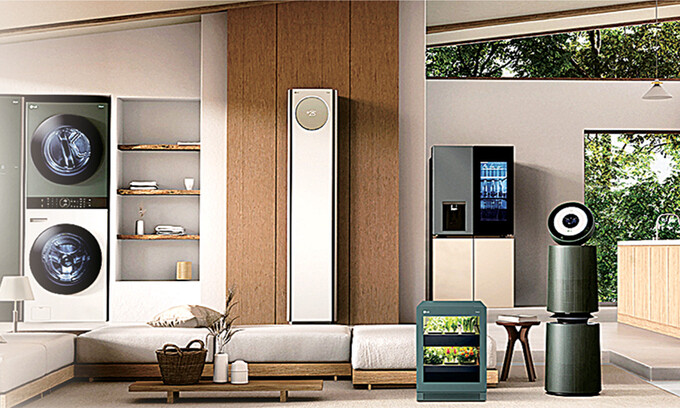
LG Electronics, traditionally known for its home appliances like TVs, refrigerators, and washing machines, is now venturing into selling entire homes. This strategic move aims to market "spaces" that integrate home appliances, HVAC systems, and AI-driven controls, marking a significant push into the B2B (business-to-business) sector, a key growth driver for the company.
LG Smart Cottage: A Showcase of Integrated Living
In Gimje, South Korea, LG Electronics has installed the "LG Smart Cottage," a modular home serving as a showroom for potential customers. This prefabricated house, primarily designed as a secondary residence, has been available for sale since the fourth quarter of last year.
The base model of the Smart Cottage, a single-story unit, spans 26.6㎡ (approximately 8 pyeong) and comes fully equipped with a range of LG appliances, including a refrigerator, washer/dryer, dishwasher, oven, induction cooktop, water purifier, air purifier, TV (StanbyME), and vacuum cleaner. The cottage also features LG's ThinQ app for integrated control of IoT devices such as door locks, home cameras, and smart plugs.
Beyond Appliances: Comprehensive Living Solutions
The Smart Cottage includes LG's heat pump HVAC system as a standard feature, providing cooling, floor heating, and hot water. This system boasts three times the efficiency of traditional gas or oil boilers. Solar power generation is available as an optional add-on.
Constructed using a prefabricated method, the LG Smart Cottage significantly reduces construction time by pre-fabricating over 70% of the structure, including modules, windows, wiring, bathrooms, and kitchen facilities. This method cuts construction time by up to 50% compared to conventional reinforced concrete construction.
However, the inclusion of high-end appliances and HVAC systems comes at a premium. The base model starts at 200 million KRW (excluding delivery and installation), while the two-story model starts at 280 million KRW. LG Electronics is collaborating with modular housing specialist Spaceway B on this project.
An LG Electronics representative stated, "Following the SM training center contract, we are continuously receiving inquiries and contracts from both corporate and individual clients regarding the Smart Cottage. There is significant interest from both B2B and individual customers."
Total Space Solution: B2B as a New Growth Engine
The Smart Cottage exemplifies LG Electronics' "total space solution" strategy, which leverages its extensive product portfolio to provide tailored living environments. This approach aims to sell "spaces" rather than just appliances, with a particular focus on expanding its B2B business as a new growth engine.
LG Electronics' participation in the International Builders' Show (IBS) 2025 in Las Vegas underscores this strategy. As the company's first appearance at the largest international construction exhibition in the United States, LG Electronics showcased built-in home appliances and heat pumps used in the Smart Cottage, aiming to establish a stronger presence in the U.S. B2B builder market. Builders, who construct residential and commercial buildings, account for approximately 20% of the U.S. home appliance market.
LG Electronics' push into the B2B sector is driven by the stagnation of the home appliance market and increasing competition from Chinese manufacturers. In the TV segment, for example, LG Electronics' market share in the fourth quarter of last year was 10%, lower than China's TCL (14%) and Hisense (12%).
Despite a 7.5% increase in revenue to 67.2639 trillion KRW last year (excluding LG Innotek), operating profit decreased by 4.9% to 2.7091 trillion KRW, with the operating profit margin falling from 4.6% to 4%.
The B2B market offers stable profitability through long-term contracts and opportunities for recurring revenue through maintenance and management services. To capitalize on this, LG Electronics has established the ES (Eco Solution) business division, focusing on HVAC.
An industry insider commented, "While LG still leads in home appliance technology, it is challenging to compete with Chinese manufacturers' volume-driven strategies in the consumer market. The company is seeking growth in the B2B market, where quality, durability, and after-sales service are crucial."
[Copyright (c) Global Economic Times. All Rights Reserved.]






























